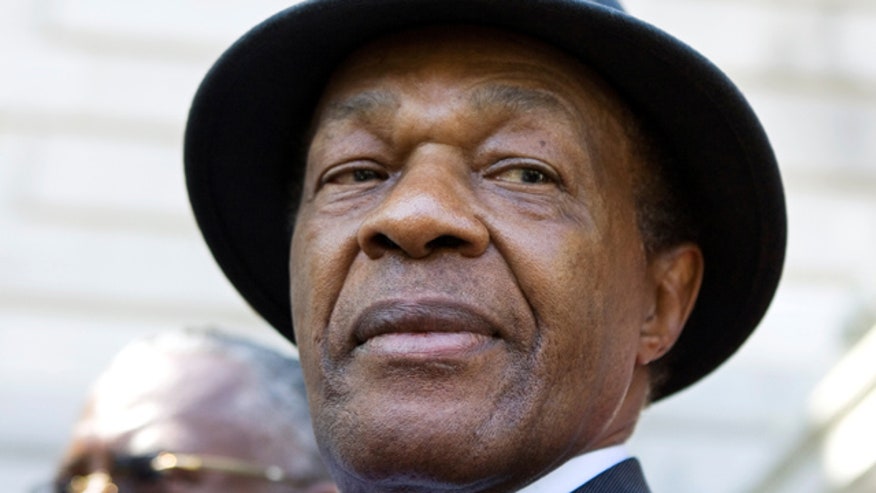Marion Barry, Former DC Mayor, Dies at 78

Marion Barry, an icon of D.C. politics good and bad for more than 40 years, has died at age 78.
"It is with deep
regret that the family of former four-time D.C. Mayor, and Ward 8 City
Councilman, Marion S. Barry, Jr., announces that he has passed," read a
statement early Sunday from Barry's family.
Barry had been
hospitalized at Howard University Hospital Thursday after complaining of
a urinary tract infection. He was released Saturday, and family members
said he seemed to feel well. "In his own words, he was 'fantabulous' --
his words, not mine," said Barry spokeswoman LaToya Foster at an
early-morning press conference at United Medical Center.
Sunday morning, Barry visited with
his son, Christopher, and then stopped to eat. On his way back into his
home from the car, Barry collapsed. His driver brought him inside the
home, unresponsive.
Barry was taken to United Medical Center at about 12:15 a.m. Sunday, and was pronounced dead at about 1:45 a.m.

Reaction poured
in as news of Barry's death spread early Sunday morning. "He loved the
District of Columbia and so many Washingtonians loved him," D.C. Mayor
Vincent Gray said in a statement that expressed "deep sadness" and
promised "official ceremonies worthy of a true statesman of the District
of Columbia."
Gray ordered flags at all D.C. buildings to be flown at half-staff beginning Sunday in Barry's honor.
In a statement
released Sunday, incoming D.C. Mayor Muriel Bowser said, "Mayor Marion
Barry gave a voice to those who need it most."
Barry had
recently taped an interview with Oprah Winfrey for her show, "Oprah:
Where Are They Now?" The Barry family statement indicated that the
interview — which included his new book, "Mayor For Life: the Incredible
Story of Marion Barry, Jr." — still would air Sunday at 9 p.m.
Barry served
four terms as mayor and had a lock on the D.C. Council’s Ward 8 seat.
But along with that huge political success, many personal failures
marked his turbulent life.
Early on in his
career, the Washington City Paper dubbed him “Mayor for Life.” He
confounded critics who railed against his melodramatic life, even as he
basked in the admiration of forgiving citizens who looked to him as
their champion.

The son of a Mississippi
sharecropper, Barry emerged from the student and civil rights activism
of the 1960s to serve on the elected D.C. school board and D.C. Council.
In 1979, Barry
began serving the first of three consecutive terms as D.C.’s second
elected mayor. His pro-business policies helped spur economic
development. He built civic programs for youth and senior citizens, and
opened the city government to many African-American professionals, who
previously had been shut out.
Of the six mayors who’ve served the
city since home rule began in the 1970s, it was Barry’s Mayor for Life
personality and rollercoaster career that helped define D.C. politics
for decades.
Barry first came
to D.C. with the Student Nonviolent Coordinating Committee. He later
helped establish and run Pride, an inner-city help group. When Congress
granted limited home rule to D.C., Barry won a first seat on the D.C.
Council in 1974.
Shot in the
chest by Hanafi Muslims when they overran at the Wilson Building in
1977, Barry used the publicity to help launch his 1978 campaign for
mayor. He was a brash reformer, equally eloquent on the streets and in
boardrooms. He narrowly won a three-way battle after The Washington Post
editorial page heavily and repeatedly endorsed him.

Despite his faults, Barry is
credited with opening the city’s government to black citizens; for
creating a massive summer jobs program that while wasteful in many cases
offered a job or paid internship to any city youth who wanted one; and
for treating senior citizens as a top priority with homes and programs
for those in the twilight of life. His pro-business stance helped fuel
the downtown real estate boom in the 1980s and helped fill his campaign
war chest. He completed the city’s first convention center on time and
on budget. In his last term as mayor, Barry landed the deal to get the
MCI Center (now the Verizon Center) built downtown.
In his final
days on the Council, Barry suffered from ailments including diabetes,
high blood pressure and infections. On the Council he was once again
pushing for summer youth jobs, development east of the Anacostia River
and help for senior citizens.
Still, his
national reputation is one of a promising politician undone or
diminished by his personal failings; a politician who rose against
seemingly hopeless odds to win and stay in the life of politics, often
in spite of himself.


Comments
Post a Comment
Thanks for commenting. You email address and IP Address has been recorded for future reference. any anonymous comment which is deemed abusive will be removed and investigated for further action.